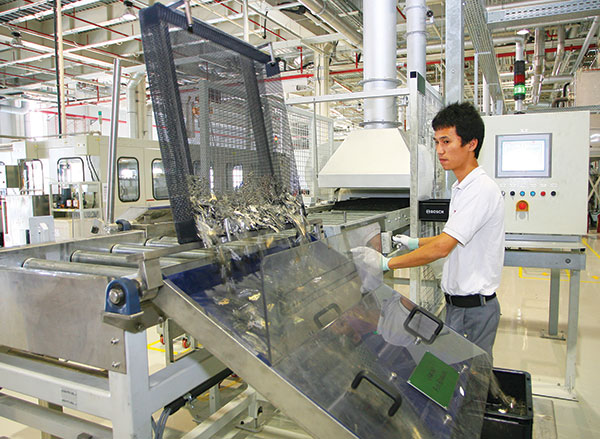Firms welcome tax revisions

The business community has welcomed changes proposed in a decree to guide the corporate tax lawPhoto: Le Toan
The Ministry of Finance recently posted its draft circular guiding the implementation of the Law on Corporate Income Tax (CIT) which amends and supplements a number of articles on its website for public comment.
“One notable change likely to have an impact on fast moving consumer goods companies and the structure of their promotional campaigns is that they are no longer required to include give-aways or gifts in their revenue calculations. The costs are treated as a capped A&P expenditure,” said Thomas McClelland, tax partner of Deloitte Vietnam.
Currently, give-aways or gifts are valued at market price and included as taxable revenue.
McClelland added that businesses had welcomed the reintroduction of tax incentives for expanding investment, which were removed in 2009.
Businesses qualify for incentives for expanding investment under three conditions including increasing fixed assets and increasing design capacity.
Expansion plans in certain locations or industries can choose between incentives for the remainder of the investment license or tax exemptions.
Notably, there is no reduced tax rate for investment expansion.
One point likely to disappoint some companies is that only businesses that qualified for incentives prior to January 1, 2014 or new projects opened after that date can qualify. New projects before January 1 are not eligible, said McClelland.
Another new point under the draft is interest deductibility. For some time, companies have been unhappy that interest on loans for investment was not included as a deductible outlay. Several appeals have been made to change this, for example in the EuroCham Whitebook 2014.
The draft law stipulates that interest on loans for investment is deductible but only by adding it to the cost base of the investment, meaning the deduction only occurs if the capital is sold at some point in the future. This is unlikely to fully appease companies.
On the same note as deductible expenses, McClelland explained that provisions in the draft, resembling those in the VAT law, require evidence of payment through a bank for purchases exceeding VND20 million (around $1,000). This is part of the government’s desire for Vietnam to move away from a cash economy and to increase tax revenue.
What the stars mean:
★ Poor ★ ★ Promising ★★★ Good ★★★★ Very good ★★★★★ Exceptional
Latest News
More News
- Cashless payments hit 28 times GDP in 2025 (February 04, 2026 | 18:09)
- SSIAM and DBJ launch Japan Vietnam Capital Fund (February 04, 2026 | 15:57)
- Banks target stronger profits, credit growth in 2026 (February 04, 2026 | 15:43)
- Vietnam on path to investment-grade rating (February 03, 2026 | 13:07)
- Consumer finance sector posts sharp profit growth (February 03, 2026 | 13:05)
- Insurance market building the next chapter of protection (February 02, 2026 | 11:16)
- NAB Innovation Centre underscores Vietnam’s appeal for tech investment (January 30, 2026 | 11:16)
- Vietnam strengthens public debt management with World Bank and IMF (January 30, 2026 | 11:00)
- Corporate bond market poised for stronger growth cycle (January 28, 2026 | 17:13)
- Vietnam's IPO market on recovery trajectory (January 28, 2026 | 17:04)
















 Mobile Version
Mobile Version